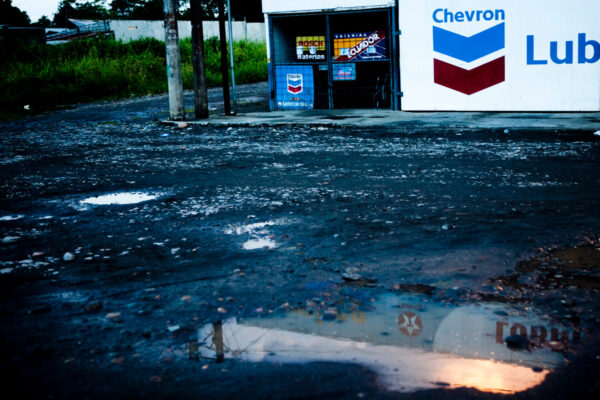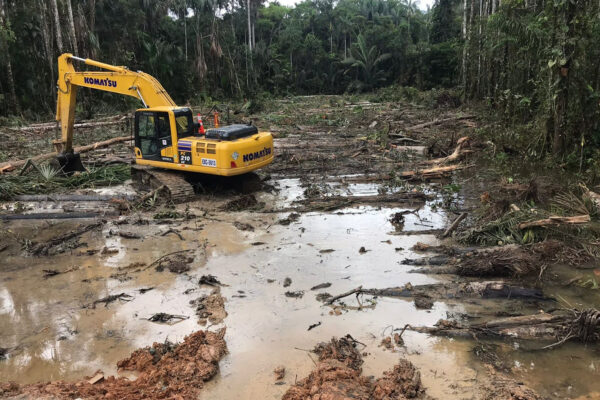Peru’s Amazon state, Loreto, takes up almost a third of the entire country.
A vast expanse of rainforest divided by tributaries of the Amazon river, even its main city Iquitos is only accessible by boat or plane.
But its inaccessibility has not discouraged oil companies from hunting for black gold, and they have been doing so for the last 35 years.
During that time, the Achuar people, who have lived in harmony with their environment in this part of western Amazon for thousands of years, say their way of life has been systematically violated.
The Federation of Native Communities of the Corrientes’ river (FECONACO) says that for every barrel of oil there are nine barrels of contaminated water produced as a by-product – a total of more than a million barrels a day.
The water contains high concentrations of hydrocarbons and heavy metals, like lead, cadmium, mercury and arsenic.
The Achuar people say it is destroying the fragile eco-system in which they live, killing the fish and wildlife, contaminating their water source and seriously damaging their health.
Health problems
Geanina Lucana is a nurse who has been working with indigenous communities in the area for six years. She says the contamination affects every part of the human body, causing a chronic breakdown of the immune system.
“The toxins affect the central nervous system, causing a complete mental and physical breakdown. I’ve seen a person die but the doctor was not able to determine a single cause of death,” she said.
It is widely acknowledged that high levels of heavy metals, hydrocarbons and chlorides can cause serious physical and mental health problems, including cancer and genetic deformities.
A survey carried out by Peru’s Ministry of Health in May found that cadmium levels in the blood of more than 98% of the Achuar exceeded safe levels.
The oil companies, with the complicity of the state, are systematically violating our human rights Robert Guimaraes, vice president of AIDESEP
And more than 66% of children had levels of lead in their blood which exceeded the maximum permissible.
Yet despite the evidence of its own health ministry, the Peruvian government has been slow to act.
Different worlds
Last week, Achuar leaders, with the help of two not-for-profit groups, brought their fight to Peru’s capital, Lima.
At one end of a large boardroom table, two apus – or community leaders – sat dressed in western clothes but with their traditional head-dresses.
At the other end of the long table sat three suited officials from Peru Petro – the state-run body which issues licences to foreign oil companies.
For a short time these people from different worlds inhabited the same space, while the community leaders from the jungle spoke of their outrage in their own Achuar language.
“I represent 31 communities and we all say we don’t want more oil companies on our land,” said Cesar Dawua, leader of the Providencia community.
“You live happily here in Lima working for the Peruvian state,” he told the state officials. “We too want to live happily in our community of Rio Corrientes – but we can’t because of the contamination.
“That’s why we’ve come to say to you loud and clear that this is the last opportunity that we have to try to resolve this issue – you can’t allow this to drag on any more.”
The issue was not resolved, however, despite the appeals of the community leaders.
Extreme poverty
Both FECONACO and the Inter-ethnic Association for the Development of the Peruvian Jungle (AIDESEP) have appealed to their government to make the oil company, in this case Pluspetrol, re-inject the contaminated water back into the earth.
Pluspetrol say they plan to be able to re-inject 20% of the waste water by 2009.
However, Peru’s vice-minister for energy and mines, Pedro Gamio, says the government is pressing Pluspetrol to re-inject 100% of the contaminated water by that date.
He added that the oil company stated this would be impossible because it lacked the correct equipment to carry out the work.
Mr Gamio went on to say he could not order them to stop production because this would affect the country’s economy and in turn a portion of the company’s royalties, which are returned to the Corrientes region.
The region provides 60% of the oil consumed in Peru. At the same time it is also officially registered as a zone of extreme poverty.
The Peruvian government says the oil and mineral companies are bringing wealth and helping development in the country.
But those representing indigenous communities say they pay too heavy a price.
Robert Guimaraes, vice-president of AIDESEP, says: “”The Peruvian state is incapable of imposing sanctions on those who pollute our rivers and our land. Where is the justice?”













